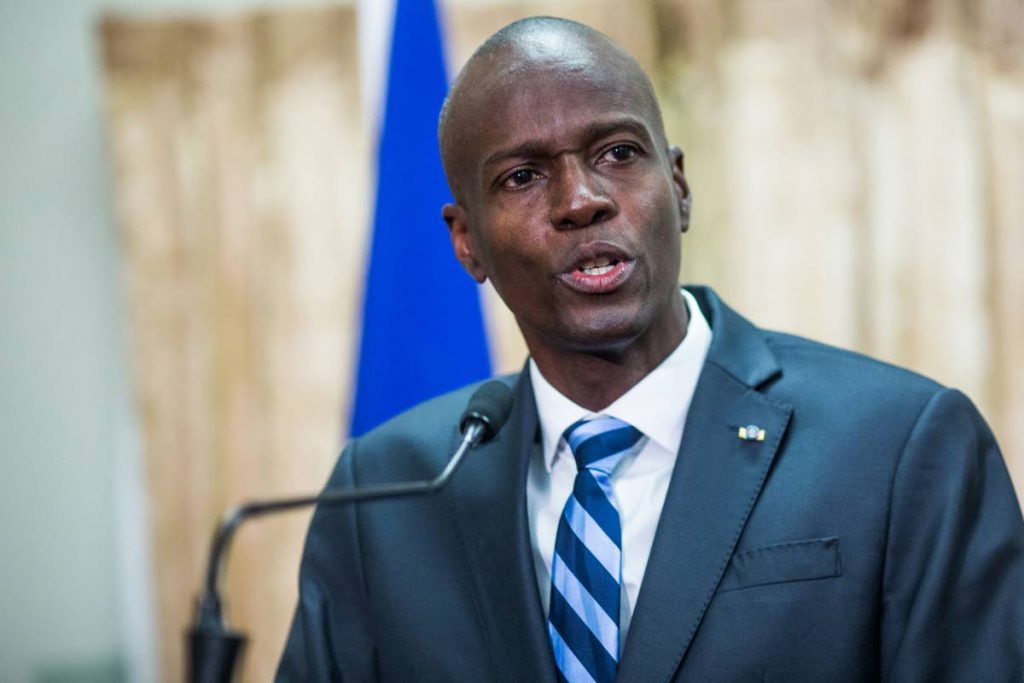Moise: 'Banana Man' to president

BEFORE his entry into politics and election as Haiti's president in 2015, Jovenel Moise had several business interests, including being a banana plantation owner.
Moise, 53, was assassinated at his private home on Wednesday.
He was born on June 26, 1968 in Trou-du-Nord, Haiti, the son of merchant Etienne Moise and seamstress Lucia Bruno.
His family moved to Port-au -Prince when he was six. Moise studied at the Don Durélin National School, the Lycée Toussaint Louverture, and the Cultural Centre of the Collège Canado-Haitien. He studied political science at Université Quisqueya, where he met his future wife Martine.
After university, Moise created his first business in Port-de-Paix, Jomar Auto Parts, which is still in operation today. He also set up a 25-acre banana plantation in the Nord-Ouest district. The plantation was supposed to export bananas to Germany, for the first time since 1954. While only two containers of bananas were ever sent to Germany, Moise earned the nickname "Nèg Bannann (Banana Man)."
In 2001, he partnered with Culligan, a company based in Port-au-Prince, to open a water plant to serve Haiti's northwest and northeast districts.
In 2004, Moise became a member of the Chamber of Commerce and Industry of the Northwest (CCINO). Soon after, he was elected its president. He later became secretary general of the Chamber of Commerce and Industry of Haiti (CCIH).
In 2008, he helped found the Haitian Energy Company SA, which was supposed to bring solar and wind power to ten communities in northwest Haiti.
In 2012, in Trou-du-Nord, he founded Agritrans SA and helped create Haiti's first agricultural free trade zone. This led to more than a dozen agricultural projects that created almost 3,000 direct jobs and 10,000 indirect jobs.
Moise entered politics in 2015, when then president Michel Martelly designated him as the presidential candidate of the Haitian Tèt Kale Party. In his campaign, Moise promoted bio-ecological agriculture as an economic engine for Haiti. He also expressed support for policies pursued by Martelly, such as universal education and health care, energy reform, rule of law, the creation of sustainable jobs and environmental protection.
Moise received 32.8 per cent of votes in the first round of the elections held on October 15, 2015, with 54 candidates competing, qualifying for a runoff with the second-place finisher, Jude Célestin.
But an exit poll by the Haiti Sentinel reflected Moise receiving only six per cent of the vote.
Célestin and other observers called the results fraudulent. This led to violent street protests, which forced the postponement of the runoff election. The ballot was subsequently annulled in June 2016.
On November 27, 2016, election officials said Moise had won the 2016 election in the first round based on preliminary results, with an estimated voter turnout of 21 per cent, beating 26 other candidates. Four of those candidates claimed victory before the official results were announced.
Moise faced challenges from opposition leaders who believed that his mandate should end from the date of the inconclusive 2015 elections.
Moise was sworn in as president on February 7, 2017 for a five-year term. He started projects to rehabilitate roads, water supply and energy systems. In May 2018, media reports estimated 42 per cent of the population had access to drinking water. In June 2018, Moise opened a power plant to help improve Haiti's electricity supply. He also began to re-establish the army, which was disbanded in 1995.
In 2019, there were mass street protests as Haitians demanded Moise’s resignation amid allegations that he and other government officials had embezzled hundreds of thousands of dollars' worth of funds earmarked for badly needed social programmes.
In response Moise said, "I’m looking you in the eye today to say: your president, whom you voted for, is not guilty of corruption.” In November 2019, he met at the Haiti National Palace with US Ambassador to the UN Kelly Craft, about ways to implement a consensual resolution of Haiti's political crisis through dialogue.
But his move to create a new constitution for Haiti caused an uproar, as his opponents argued that the constitutional changes Moise was proposing would give the presidency more power. Accusations made against Moise including trying to create an intelligence agency that answered only to him and by approving a decree that limited the powers of a special court to audit government contracts and root out corruption. Moise's critics claimed he was following practices adopted by former dictators Francois “Papa Doc” Duvalier and Jean-Claude “Baby Doc” Duvalier, Some observers claimed those efforts by Moise were derailed by the covid19 pandemic and insecurity in Haiti.
In a Miami Herald article on Thursday, a Haitian community leader in Miami, Leonie Hermantin, said, "To some he was a corrupt leader, but to others he was a reformer."
Former Haitian senator Simon Desras, in the same article, said Moise's battle against wealthy and powerful interests in Haiti could have led to his death.
"I remember in his speech, he said he just targeted the rich people by putting an end to their contracts. He said that could be the reason for his death, because they are used to assassinating people and pushing people into exile.”

Comments
"Moise: ‘Banana Man’ to president"